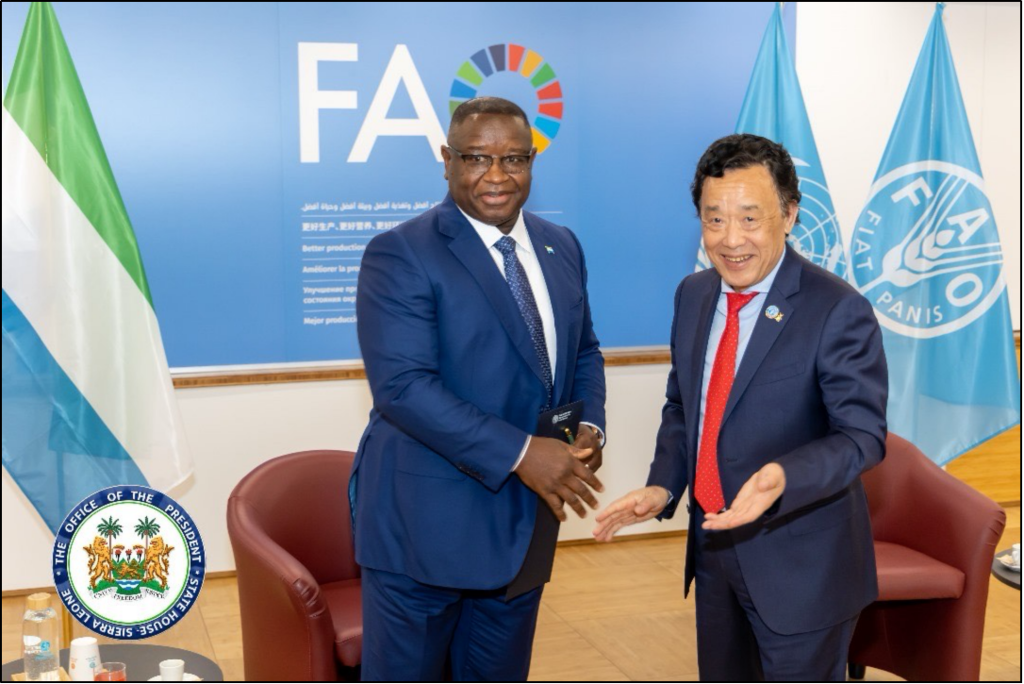President Julius Maada Bio met with Dr Qu Dongyu, Director-General of the Food and Agriculture Organisation (FAO)President Julius Maada Bio met with Dr Qu Dongyu, Director-General of the Food and Agriculture Organisation (FAO), in Rome as part of a major diplomatic effort to revitalise Sierra Leone’s agricultural landscape. This meeting was critical in reinforcing the FAO’s role as a key development partner in Sierra Leone’s pursuit of improved food security and agricultural advancement. The discussions focused on supporting the country’s flagship agricultural initiative, Feed Salone, which aims to transform the agricultural sector and ensure sustainable food systems.
During the meeting, President Bio expressed his heartfelt gratitude for the FAO’s ongoing assistance in improving Sierra Leone’s food systems. He articulated his administration’s vision for repositioning agriculture as the foundation of the national economy. “FAO has played an important role in supporting our food system efforts, and your leadership in aligning global food security priorities with the needs of developing countries like ours is admirable,” President Bio said. This acknowledgement emphasises the critical role of international partnerships in addressing local agricultural challenges.
The FAO’s involvement in the Sustainable Agrifood System Intelligence (SASI) initiative was a major topic of discussion during the dialogue. This initiative resulted in an operational investment plan for Feed Salone’s Pillar 3, which focuses on the critical areas of agricultural product aggregation, processing and marketing. President Bio emphasised the importance of mobilising investment in these sectors to drive agricultural transformation. He urged the FAO to continue supporting investment flows and aligning agricultural policies to meet the sector’s changing needs.
While Sierra Leone has made commendable progress in increasing domestic food production, particularly through rice cultivation, significant challenges remain. Post-harvest losses and limited access to improved seed varieties hampered the country’s agricultural potential. President Bio emphasised the critical need for increased interventions in the rice sector to reduce food imports and strengthen local production capabilities. He recognised the FAO’s expertise in this area and advocated for a strategic partnership to effectively address these productivity challenges.
In addition to addressing local issues, President Bio reiterated Sierra Leone’s commitment to the South-South Triangular Cooperation Program. This initiative seeks to foster collaboration with countries such as China, Vietnam, and Japan to improve rice seed systems and post-harvest technologies. He urged the FAO to facilitate this collaboration, emphasising the importance of increasing knowledge exchange, financial assistance, and technological innovations to maximise impact.
Climate change emerged as another major concern during the discussions. President Bio articulated Sierra Leone’s vulnerabilities as a result of climate-related disruptions, such as erratic weather and soil degradation. He emphasised the importance of climate-responsive agricultural financing as well as the use of modern technologies to increase agricultural resilience and productivity. “FAO’s global leadership in climate-smart agriculture is well recognised, and we want to leverage your expertise to support our efforts in this area,” he said, emphasising the link between climate action and agricultural productivity.
Furthermore, President Bio reiterated his administration’s commitment to attracting private-sector investment in agriculture. He emphasised the importance of innovative financing models that reduce risk and unlock capital for smallholder farmers, who are critical to the agricultural sector. The President expressed optimism about deepening collaboration with the FAO to ensure Sierra Leone’s long-term food security.
In response, Dr Qu Dongyu praised President Bio’s visionary leadership and dedication to agricultural transformation. He reaffirmed the FAO’s dedication to supporting the Feed Salone initiative and facilitating strategic investments that would enhance food security and stimulate economic growth in Sierra Leone.
The meeting ended on a positive note, with both leaders expressing a shared vision for increased agricultural productivity, sustainable food systems, and stronger South-South cooperation. As Sierra Leone begins its journey towards agricultural transformation, the FAO’s role as a strategic partner will be critical in achieving the country’s ambitious development goals. Sierra Leone’s collaboration with the FAO promises to pave the way for a more resilient agricultural future, addressing both local and global food security concerns.
